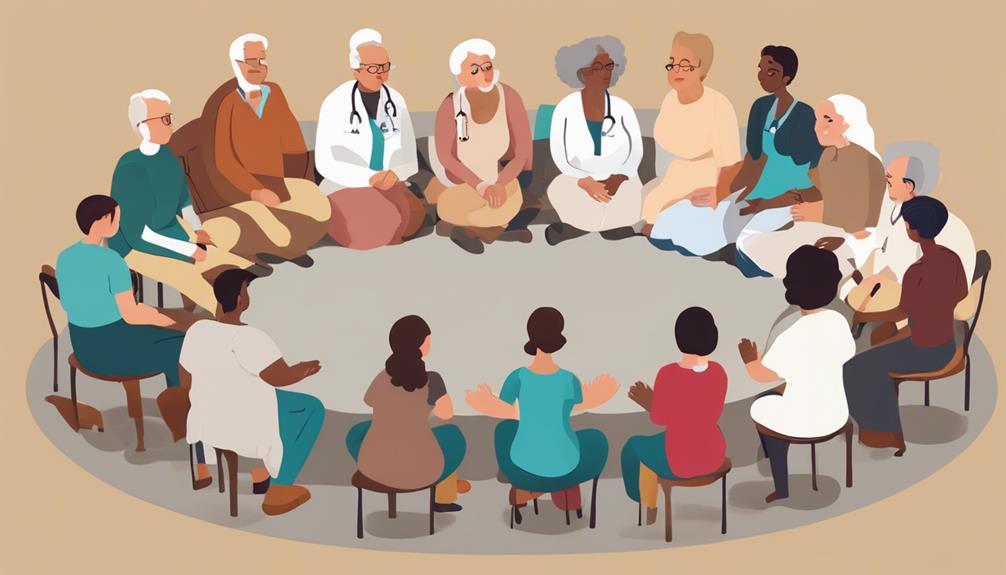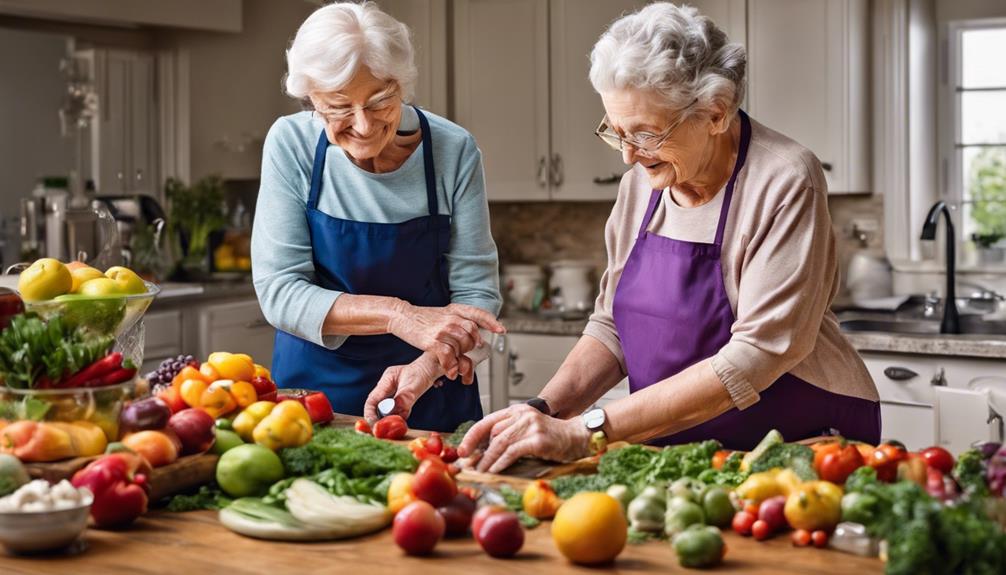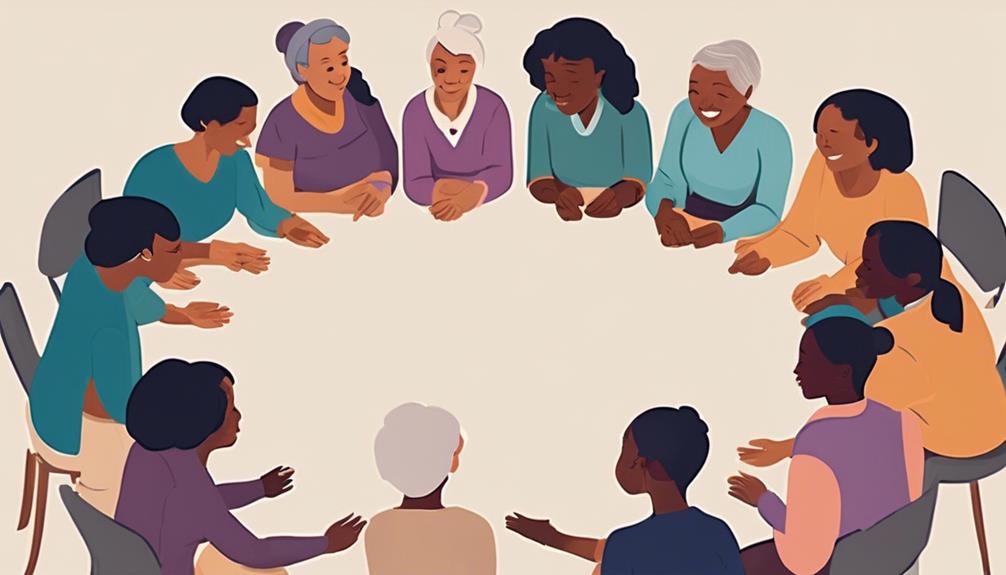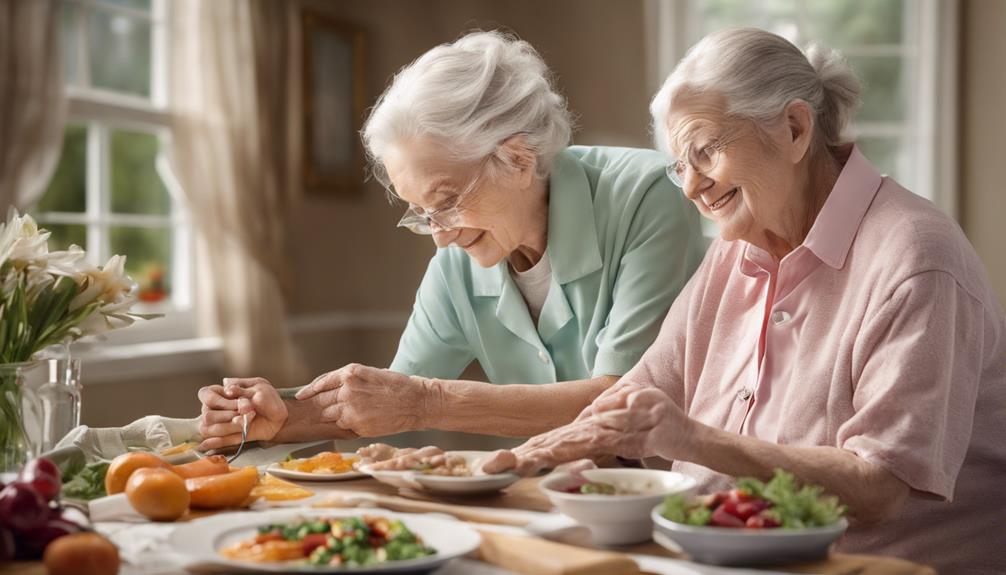Caregiver support groups serve as beacons of light in difficult times, offering advice and comfort to those facing the tough journey of caregiving. The shared stories, compassionate empathy, and helpful advice shared in these groups create a crucial support system for caregivers.
However, the true power of these support groups lies not just in the assistance they offer but also in the transformative impact they can have on the individuals involved. Stay tuned to uncover the profound effects of caregiver support groups on emotional well-being, social connections, and practical caregiving strategies.
Key Takeaways
- Emotional relief and solidarity through shared experiences.
- Disease-specific support enhances coping skills and tailored resources.
- Access to expert guidance and resources for informed caregiving.
- Support groups foster emotional resilience, practical advice, and coping strategies.
Understanding Caregiver Support Groups
Caregiver support groups provide a platform where individuals can share their experiences, strategies, and resources with others facing similar challenges. These groups offer emotional support, practical advice, and peer validation, creating a supportive environment for family members caring for loved ones with chronic illnesses like dementia. Facilitators play a crucial role in guiding discussions and providing caregiver assistance by offering resources and information tailored to the group's needs.
The shared experiences within these support groups can help caregivers feel understood and less isolated in their journey. By connecting with others who are going through similar situations, caregivers can gain valuable insights and coping mechanisms to navigate the complexities of their roles effectively. Understanding caregiver support groups is essential for those seeking a community where they can find understanding, guidance, and solidarity in their caregiving responsibilities.
Benefits of Joining a Support Group

Moving from understanding the foundation of caregiver support groups, we now explore the invaluable benefits that come with joining these supportive communities. Joining a caregiver support group can provide emotional relief and solidarity through shared experiences with others facing similar challenges. Being part of such a community offers a sense of belonging and understanding that can be incredibly comforting. In these groups, members support each other by sharing valuable resources, advice, and practical tips for daily caregiving tasks, which can enhance one's caregiving skills significantly.
Moreover, caregiver support groups often involve trained professionals who provide expert information and guidance to caregivers. This expert input can offer clarity on complex caregiving situations and help individuals make better-informed decisions. Additionally, some support groups offer information about respite care services, giving caregivers the opportunity to take much-needed breaks and recharge. By joining a caregiver support group, individuals become part of a diverse and supportive community that includes family caregivers, professional caregivers, and former caregivers, fostering a sense of unity and shared purpose in caring for others.
Disease-Specific Support Groups
Disease-specific support groups cater to individuals facing the challenges of managing particular medical conditions by providing targeted assistance and information. These groups offer tailored resources, education, and strategies to help caregivers navigate the unique challenges associated with diseases like cancer, Alzheimer's, diabetes, or heart disease. By focusing on a specific condition, disease-specific support groups enhance coping skills and emotional support for both individuals with the disease and their caregivers.
Key Points:
- Expert Guidance: Disease-specific support groups provide a platform for sharing experiences, discussing disease-specific challenges, and accessing expert advice from healthcare professionals.
- Advocacy and Awareness: These groups play a crucial role in advocating for research, funding, and policy changes related to the specific medical condition, while also raising public awareness.
- Specialized Support: Disease-specific support groups offer specialized support for caregivers facing distinct challenges, fostering a sense of community and understanding among individuals dealing with similar issues.
Access to Resources and Expertise

In our journey to support caregivers, we ensure access to a wealth of resources and expertise through caregiver support groups. These groups serve as invaluable platforms where caregivers can tap into a vast array of resources, including expert speakers who provide insights into specific conditions and caregiving techniques. By participating in these groups, caregivers gain knowledge empowerment, equipping them with the necessary information to make informed decisions about the health and well-being of their loved ones.
Moreover, caregiver support groups often collaborate with local organizations and agencies to ensure that necessary services are readily available to those in need. This collaborative effort not only enhances the accessibility of essential resources but also fosters a supportive community where caregivers can share experiences and learn from one another. By facilitating access to expert advice, sharing available resources, and promoting informed decision-making, these groups play a crucial role in enhancing the overall caregiving experience and promoting the well-being of both caregivers and care recipients.
Emotional Resilience and Coping Skills
To enhance emotional resilience and cultivate effective coping skills, caregiver support groups provide a nurturing environment for sharing experiences and feelings. These groups offer emotional support and validation, essential for maintaining emotional well-being in challenging caregiving situations. Through shared experiences, members learn practical strategies and gain encouragement to navigate the complexities of caregiving, fostering adaptability and emotional resilience.
Key Points:
- Emotional Support and Validation: Support groups offer a safe space for caregivers to express their emotions openly and receive validation, promoting emotional well-being.
- Coping Skills and Adaptability: Participants in these groups learn effective coping mechanisms and strategies to deal with the stress and demands of caregiving, fostering adaptability in the face of challenges.
- Shared Experiences and Encouragement: By sharing experiences and providing mutual support, caregivers develop a sense of camaraderie and receive encouragement, which contributes to building emotional resilience and strength.
Frequently Asked Questions
Why Caregiver Support Groups Are Important?
Support groups are crucial for caregivers because they provide a sense of community, valuable advice, and understanding. These groups offer a safe space to share experiences and seek guidance, reducing stress and enhancing coping skills.
What Kind of Support Is Most Necessary for the Caregiver?
We find that caregivers often need a combination of emotional, practical, and social support to navigate their responsibilities effectively.
Juggling the demands of caregiving can be overwhelming, so having a strong support system in place is crucial.
Emotional support helps us cope with the stress and emotional toll of caregiving, while practical assistance offers valuable tips and guidance.
Social connections provide a sense of community and understanding, making the caregiving journey less isolating.
What Are the Goals of a Caregiver Support Group?
The goals of a caregiver support group are to create a safe and welcoming space where individuals can share their caregiving experiences, feelings, and practical advice.
We aim to foster a sense of community and belonging among caregivers who often feel isolated.
Why Do Caregivers Need Social Support?
As caregivers, we need social support to combat feelings of isolation and loneliness. Connecting with others in similar caregiving situations provides a sense of camaraderie, understanding, and validation.
Social support helps us feel empowered, validated, and better equipped to navigate the challenges we face. It offers practical assistance, emotional relief, and a sense of belonging in a supportive community.
This support is crucial for our mental health, stress reduction, and coping skills.
Conclusion
In conclusion, caregiver support groups play a crucial role in providing emotional, social, and practical assistance to individuals caring for loved ones.
Did you know that studies have shown that caregivers who participate in support groups experience lower levels of stress and depression?
By joining a support group, caregivers can find comfort, understanding, and valuable resources to navigate the challenges of caregiving.
Remember, you aren't alone in this journey.









